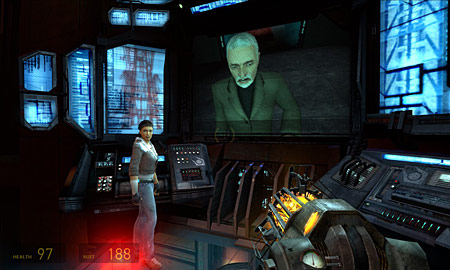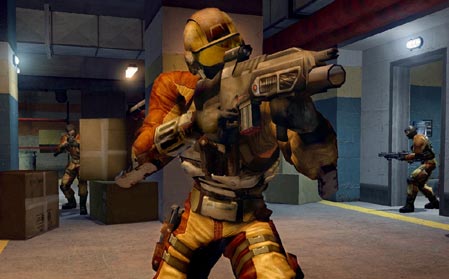Noel Murray from The Onion's A.V. Club has just finished his two-part 'series' of musings on modern media serialization and, even though the topic of video games never arises in them, I highly recommend checking them out (Part 1, Part 2A and Part 2B). He mostly scrutinizes two of the most popular current serial forms, television & comic books, but it's what he scrutinizes in them that makes it a quality read.
Mr. Murray, in his examination of serialization repeatedly returns to the same themes, those of consistency, intention and continuity, as what ultimately makes or breaks an episodic effort. It's hard to apply the same criteria to episodic gaming, simply because it's little more than an experimental genre at this point, consisting of a handful of unfinished proof-of-concepts, but it's not a stretch to speculate that the same problems that plague other serial efforts will rear their heads in gaming too.
For example, take Mr. Murray's example of Dave Sim's Cerebus where he knocks Sim's adoption of background-artist Gerhard as changing the series' storytelling schema for the worst. It's hard not to imagine similar dramatic technological shifts occurring with future Half-Life 2 episodes, given the constant tweaking of the Source engine and year-long gaps between episodes. Obviously, technology and art design changes and evolves over time, but say, if all of the sudden the Source engine became optimal for tight interiors, it might prove troublesome for potential future episodes requiring large and expansive shots. In theory, a game's engine would grow with the story's needs but, just as how sometimes storytellers can't keep pace with the technology, tech can't always keep up with aspiring, and changing storytelling needs.

To see this, you don't have to look much further than Mr. Murray's proclamation that "the biggest problem with serialization is how success changes plans." The strengths of a episodic narrative, being able to adapt and follow another path and shape it into something more intriguing, or to rescue a story arc that just isn't living up to its potential (for examples, see Part 2A), aren't necessarily feasible given a game's engine. Games simply aren't as flexible at accommodating narrative whims as say, television where a few sets can be tossed in, or comics where anything that can be set to paper can be portrayed.
With the one of the innate strengths of a serial severely limited inhibited by the realities of game development, it has be asked: is there a strength to serial gaming? And do those strengths out-weigh the weaknesses? What exactly is it that we want from interactive episodic content? I've previously trotted out such potential as improved character development, faster turnaround, cheaper development costs, shorter, more focused & fulfilling play experiences, and so on. On paper, this looks great (at least to me) but, given the 'gamer bravado' that's so prevalent online, will gamers ever actually accept games that are smaller, shorter, more manageable experiences instead of clamoring for 40 hour epics, bloated with back-tracking and tedious power-leveling?
Then there's the matter of waiting, which somewhat falls under Mr. Murray's theme of consistency. To put it bluntly, no recent serial gaming effort has been timely in the least. Murray mentions Concrete as an example of a comics series that does release schedules right ("[Paul Chadwick] doesn’t publish a Concrete series until its done, and ready to come out monthly in seamless form.") which Valve might want to take to heart considering Half-Life 2: Episode Two has been delayed again, placing nearly a year's distance between it and the inaugural episode. Sure, Telltale's trying to stick to a monthly schedule with Sam & Max but, when the second part comes out two months after the first episode's release, it's hard to believe that episodes three through six will be out in half that time. Certainly gamers are willing to wait for episodes and don't demand a grueling weekly release schedule, but if developers are unable to reliably, and with some frequency, release the episodes, it begs the question 'why go episodic at all?'

I don't want to kick episodic games to the curb quite yet as, apart from perhaps Majestic, no episodic effort has yet to even complete an entire run yet. With the number of 'stalled' efforts sadly piling up (SiN, Bone both being recent efforts lacking any official future), it's sad to think that the potential is being squandered but, if developers can't provide bite-sized games with some frequency and flexibility, why bother with announcing a six-episode game that'll just get cut short? Why not release it as a compromised, fifteen hour game so we can at least play some of the intended vision?

So, we all know why I'm a serial gaming proponent, but what would you like to see it bring to the table? Do you think all attempts should be scrapped and rolled into a singular project? Or is the only appeal of the current episodic series the fact that they involve a cast & crew you're already familiar with, such as Gordon Freeman or the Freelance Police, and would buy in any form – serial or not?




#1 Soup Nov 17, 2006 01:48am
After reading Murray's articles, I think he has less issue with the idea of serialization as he does with its execution. In particular, his comments about television (especially his on-the-mark criticisms about Lost) are the delays in narrative followthrough. When the promised plot thread is tossed aside, it doesn't really matter what medium you're in, it leaves a bitter taste in your mouth. But when done right, it makes things all the better. Like real life, we have some big issues that we take some time to complete all the while dealign with the smaller things. Babylon 5 sucessfully told a cohesive five-year narrative despite having only 44 minutes segments to tell them in. Creator J.M.S. even handled changing casts in a way that, though sometimes abrupt, fit in with given information about the working universe.
Serialized Gaming, on the other hand, doesn't really have to think about about how to stretch its narrative. games generally come to the table with a given storyarc that gets wrapped up tightly (except int he case of some sequels, but that's something else entirely).
So it becomes a question of execution, which for us means time and money. Like you said, the main draw of serialized gaming is the ideally short turnaround. Rather than three small Gordon Freeman Games in ten years, we get on now and another... well, soon on a relative timescale. The question becomes how rigid is our definition? Is it a serial because it's been promised to have X number of installments? or is it serial because X number of installments came out in Y amount of time? What about puzzle games where you get one or two new levels a week?
Myself, I'm struggling to fit HL2 into the serialized definition because of the extended period of development in between. The Devil May Cry came out two years apart, yet would we think to call them a serial? What about .HACK//, a game series that proclaimed itself a finite series from the start but was never mentioned in the same breath as a serialized game (despite installments released mrere six months apart)? No one would think to call Lord of the Rings a movie serial... or would they?
But the promises of serialized gaming work very well when one considers the entire user base. The bits tend to be shorter, but that's a big draw for casual gamers. Something cheaper that you can pick up and put down easily and wrap up quickly without social life-denying marathon play sessions is exactly what they're looking for. Sure, "core gamers" will want their extended play times, but they're not the only people on the market.
One example I like to think of is X-Men Legends II. Although it's an enjoyable installment in the franchise, I could just as easily enjoyed it if it had been seperated into five different acts, each one released a two or three months in between (don't ask me how the distribution would have worked).
I think serialized gaming works for more casual and episodic gaming experiences, but it's really hard to tell without a completed set to draw from (Sam & Max seems to be strong, but it's only one episode in).
#2 Servo Nov 17, 2006 04:23pm
I refuse to read this serialized tirade against serialization
#3 Soup Nov 18, 2006 12:23am
Servo
zing!
(well, it's not really against, but still!)